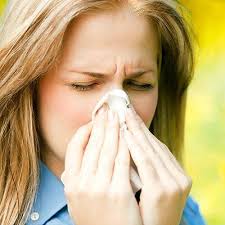Why Your "Allergies" May Just Be a Sulfur Problem 🧵

Or why a sulfur problem may be seriously aggravating your allergies.
In Energy Metabolism Governs Everything, I reported that 75 milligrams of riboflavin abolished my seasonal allergies.
At the time I attributed this to a higher need for riboflavin due to an ACAD9 mutation and thought the riboflavin may have been very generically optimizing my energy metabolism...
...due to the responsiveness of the mutation to riboflavin and its impact on both the ability to oxidize fatty acids completely and on the activity of complex I of the mitochondrial respiratory chain.
Upon further reflection, however, I believe it may have been acting primarily on sulfur metabolism, despite me not having any clearly pathogenic riboflavin-responsive mutations in the relevant pathways.
Riboflavin helps convert hydrogen sulfide to sulfite. Sulfite induces mast cell degranulation, which causes mast cells to release all their histamine and can therefore contribute to allergies or pseudo-allergies.
All of your systemically released histamine will contribute to histamine-associated health problems like sneezing and itching...
...so you do not need a genuine allergy to experience “allergies” and if you do have a genuine allergy then sulfite could “cause” it in the same way that 4 is not 2, yet 2 + 2 = 4.
That is, if you have some threshold for histamine inducing sneezing — let’s say it’s 4, to make up a number —
and 2 comes from the genuine allergy and 2 comes from sulfite, then together they make 4, inducing sneezing. By contrast, without the sulfite you have only 2 and thus no sneezing.
That is, all your histamine goes into a “histamine bucket” at which point it becomes indistinguishable by its source, unless it is only released into a local area, such as an allergen that gets stuck in your nose.
Paradoxically, riboflavin’s ability to convert hydrogen sulfide to sulfite can actually lower sulfite levels.
This is because hydrogen sulfide releases free iron and impairs the mitochondrial respiratory chain at complex IV, and together these lower glutathione levels, which elevates the degree to which we break down homocysteine to cysteine in order to make more glutathione.
As collateral damage, the elevated cysteine leads to more sulfite generated through alternative pathways of cysteine oxidation that do not depend on the production of hydrogen sulfide.
By promoting the clearance of hydrogen sulfide, riboflavin may reduce the total generation of sulfite.
On the one hand, if this hypothesis is correct it means that my experience with riboflavin abolishing my allergies may be much less idiosyncratic than I initially thought.
On the other hand, there will still be idiosyncratic differences between individuals. Indeed, since riboflavin enhances the conversion of hydrogen sulfide to sulfite, it could worsen some people’s sulfur issues, especially if they have problems with downstream metabolism of
Thus, I think trying riboflavin is a worthwhile experiment to get rid of allergies, but if it isn’t an immediate cure-all, it is best to take a more sophsiticated approach.
Further, megadosing any vitamin long-term can lead to imbalances, requiring a more sophisticated approach.
The best approach to optimizing sulfur metabolism is contained in my Sulfur Protocol, which weaves together lab work and your experience of health problems to help you assemble your personal sulfur protocol.
Have you tried riboflavin for allergies? What happened? Let me know in the replies!
For live links and references, read the web version:
Get my Sulfur Protocol here:

